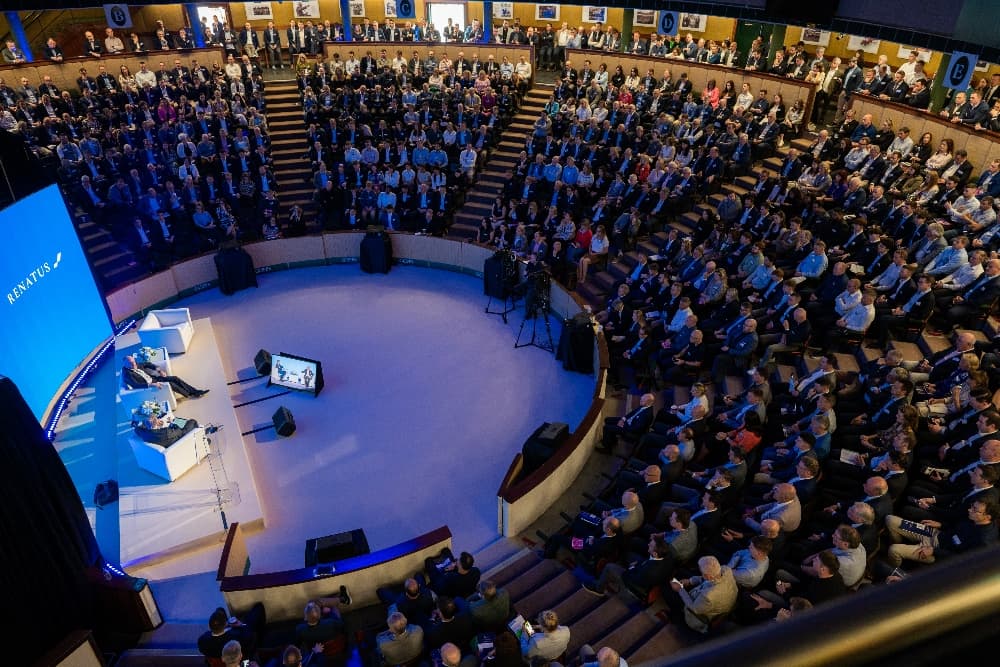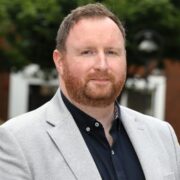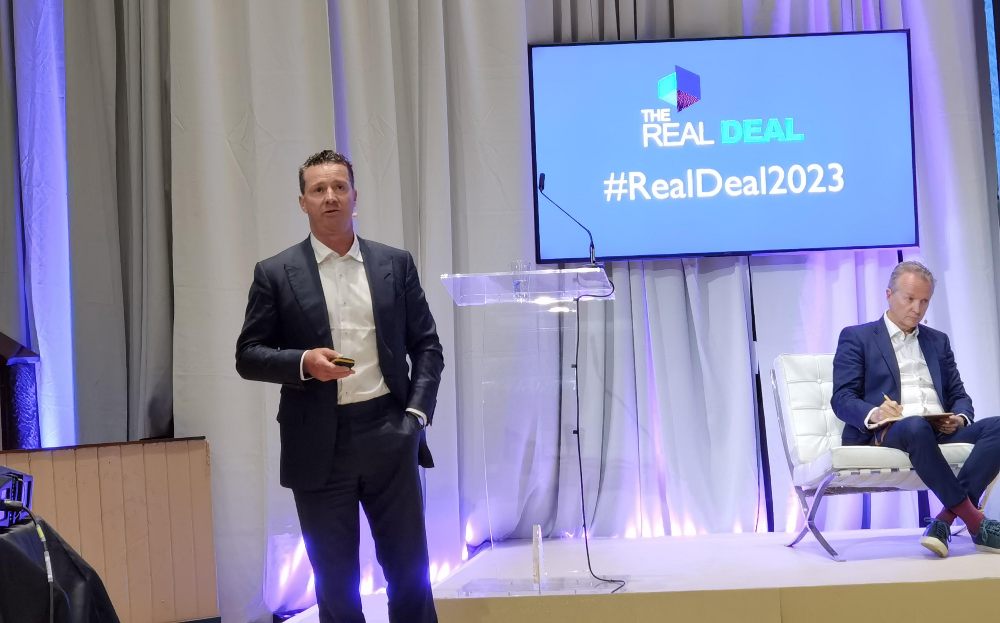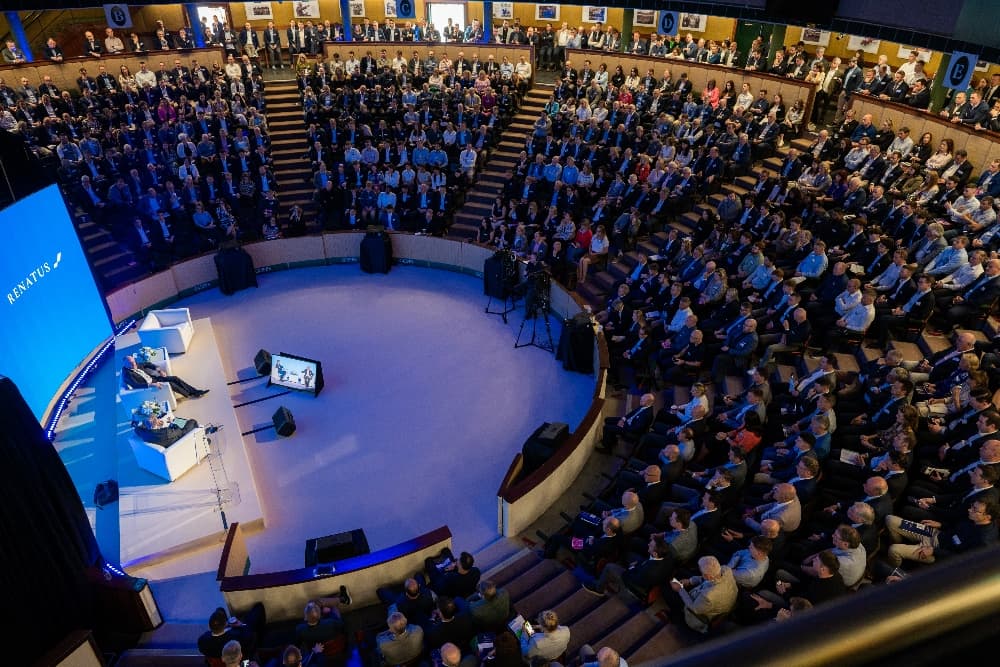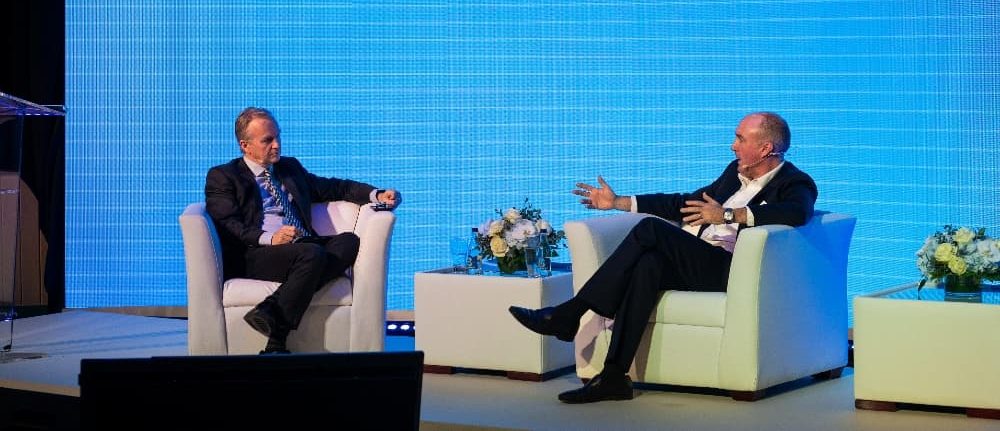Instinct combined with calculation helped John Purdy steer Ergo to become a €200m tech business that also spun out one of Ireland’s outstanding unicorns Fenergo. He recently spoke candidly about his journey at The Real Deal 2024.
Last month’s The Real Deal 2024 was organised by Renatus, Bank of Ireland and Fitzgerald Power and sponsored by LK Shields, The Currency, The Panel Interpath Advisory and Davy. The event saw leading figures in Ireland’s business world give fascinating accounts of their business careers and achievements to an audience of close to 1,100 people.
John Purdy comes onto the stage at The Real Deal wearing a medical boot, having recently broken his leg in a number of places during a holiday in Donegal. He related how he endured a five-hour drive back to Dublin while lying on his back as his wife drove. Characteristically, he doesn’t seem phased by the experience.
“If you go through any of my old notebooks. There are three B’s on the top of every page: ‘Be Brave, Be Bold, Believe’”
Hailing from a proud lineage of Guinness workers, told the event attended by 1,100 of Ireland’s business elite how he decided to break with family tradition and instead of accepting an apprenticeship with the iconic brewer he struck out on his own journey into business. And what a journey it has been.
From steel shed to hard metal
After co-founding Ergo more than 28 years ago, Purdy became increasingly interested in an entrepreneurial approach to business.
He founded IT solutions provider Ergo in 1993 with Tim Sheehy and the two-man outfit began by selling toner cartridges for printers from a garage in Cabra.
His business philosophy has seen Ergo align leading edge technology to client needs and as a result it has grown to become a €200m business with 750 employees. The business has also spun out two major Irish tech success stories Fenergo and Flow Forma and the business has acquired three other firms that include CDSoft, iSite and Micromail.
In 2021 Purdy swapped the CEO position with Paul McCann and is now chair of Ergo where he continues to bring his leadership and strategic vision to Ero and other businesses. Striving to put his entrepreneurial experience to good use as an investor in a number of early-stage tech companies, he sits on the board of Vromo which recently raised $8m.
In 2014 Purdy was named Industry Entrepreneur of the Year in the prestigious Entrepreneur of the Year Awards. He also chairs an advisory board for an EY programme focused on government policy.
Purdy’s interview with broadcaster Matt Cooper at The Real Deal oddly enough begins on the subject of succession and he related how he vehemently opposes any form of nepotism, preferring his two sons not to have any role in the business except for maybe summer work and to forge their own path or to earn their place.
He reasons how graduates coming into the business have to pass exams to gain proficiency and move up pay grades. “It wouldn’t have been right for them to be doing exams and then have these lads just rocking up, it wouldn’t have been right for my sons either. So look, maybe in 10 years’ time when they’ve aged a bit more I’ll tell you if that was a good decision. But it feels right.”
He noted how a meeting at his house recently as he recovered from his injury where he sat in his dining room in a rented hospital bed prompted CEO Paul McCann to blurt: “For f***’s sakes, I’ve just walked onto a scene from Succession.”
Calculated transformation
The Real Deal 2024 at Goffs, Co Kildare
Having made a career for himself in sales, the spark for Purdy was being passed over for a manager position in the UK. “I was refused because I was doing a great job here. I felt that was curtailing my ambition, my journey.”
He recalled how a friendship struck with businessman Tim Sheehy when Purdy was just 17 years old was crucial. Sheehy was an established businessman 20 years Purdy’s senior and the two had often discussed going into business together. “That was a pivotal moment in my life.
“To start a journey in my mind you have to be aligned with your co-founder and it’s as important as a marriage. If you have to have a life partner, you have to be aligned with them too because they’re going on that journey as well. My life partner was very much behind me and still is. She understood that the two holidays a year, the cars, all of that stuff would have to go for the first five years because we would be operating on fumes.”
Starting lean, the philosophy was also to act big. “This was an approach driven by Tim, that we have to think like a bigger business from day one with forecasting and regular strategy meetings. And today, 28 years later, we are still acting like we are struggling.”
He recalled how when pitching for business in Northern Ireland, Ergo won out over larger competitors. “When I asked our customer why we won he said: ‘It’s very simple; your business is led by entrepreneurs and the people in your business are entrepreneurial.’ So rather than have to deal with customer support in Germany or wherever, they knew we’d have the answer the very day. So I feel that approach gave us differentiation in a market that was very hard to differentiate in.”
While the business acted big, it was anything but big in the early days. “It was horrible. It was a great start but it was dirty and messy. We were recycling toner cartridges. It was not a sustainable business and it was hard to scale up. But it set us on a journey that we’re still on, where we constantly work on innovation. We say to the people we’ve hired: ‘If you’re not comfortable with change, go somewhere else. Because in here, it’s all about change. Nothing stands still.’
“The business started in Tim’s garage on the Cabra Road and in my spare bedroom. We had to move out of my spare bedroom when my wife became pregnant with our first son and we moved to a bigger shed near Cross Gun’s Bridge that had tarmac on the floor, a corrugated roof, there were holes in the wall and you could see the 3.30pm to Mullingar going by. There was no running water. There was a tap outside that we used to fill the kettle. We used to have to wait until the guy who was renting it to us turned up so if you needed to use the loo before 10 o’clock you were in trouble. But it was lean. We were not spending the few bob we had on a building – that came much later when we needed to be more professionalised. So the seed capital of the business was £20,000, of which £10k came from Tim and £10k from me. That business is now a €200m business. It’s in seven locations around the globe. It has 750 employees. So I think that’s a good return.”
Using innovation to differentiate
A key differentiator for Ergo in the market in the 1990s – a phenomenal period where Ireland went from an economic backwater to a major magnet for foreign direct investment – was that the business had cultivated printer software skills. “We were the only people in this country that understood ‘page language’ and it was absolutely material to one of our customers Dell’s production facilities, for example.”
The machines at the time had a lifespan of 300,000 pages and the systems struggled to keep up. Ergo innovated by doubling down on software development and introducing electronic fax products to the market, a game-changer at the time. “We then moved into colour printers and Primark were the first customer to have that.”
Through innovation Ergo had learned to move from low-value, high volume sales to higher-value deals. It was no longer about cartridges, it was about weaving the business into higher level strategic work through software. It created an ethos of innovating your way to scale.
The scaling journey was not without its problems but Purdy and his colleagues had learned how to apply their ethos to good effect. An example of this was the financial crash of 2008 and at the time up to 40% of Ergo’s business had been in banking with customers like Bank of Scotland and various subprime mortgage lenders.
Panic stations ensued as sales began to evaporate overnight. “Our CFO at the time said we had to make cuts. Myself and the sales director said ‘Let’s not be too hasty here.’ We started to figure out that the banks had different challenges.
“Every time that new banking regulations came out of the US or Switzerland we punched the air because we had figured out a solution.”
The technology created by Ergo was selected by NAMA to manage its portfolio of loans, beating off competition from major tech giants. “I got a call one day from this brash New Yorker after the deal had been announced who said ‘who the f**k are you?’ and I replied ‘I’m going to be your biggest pain in the arse.’
That technology was what led to the creation of Ergo’s spinout business Fenergo, now one of Ireland’s tech unicorns valued at more than $1bn. Fenergo currently helps top financial institutions including ICBC Standard Bank, Santander, Mizuho, ABN AMRO and BNP Paribas to digitally transform their end-to-end client lifecycle processes.
“If you go through any of my old notebooks. There are three B’s on the top of every page: ‘Be Brave, Be Bold, Believe.’ So I had to apply that to myself.”
The next major chapter for Ergo’s scaling journey was turning it into a cloud provider. “That was a gradual process. The market was driving that change. If we didn’t conform to that and train our people to be prepared for that, we were dead in the water. Because the traditional way of delivering technology was dying. So we put a lot of money into training people around cloud. And we put a lot of effort into acquiring a couple of small businesses that gave us that capability. It’s another example of how I think we tried to innovate really well.”
A recent innovation-led pivot by Ergo has been a move into the low-code software movement. “We have started building this platform in Dublin and Romania and that business has about 120 customers globally with €3.5m recurring revenue. In the next 12 months that will get to €5m. It still has a journey to go.”
Hallmark of leadership
The decision to swap roles from CEO to chair of Ergo in 2021 wasn’t one that Purdy took lightly. “I walk a lot. It is good for my head. And all that summer I was saying ‘I’ve been doing this job for 28 years, we’re still progressing, we’re at €110m in revenue.’ I still had the energy but I wondered if it needed a new lens, or were we going to sell it at some stage? I didn’t want to be the 60-odd year-old CEO who was working into a 40-year-old private equity pup, that wouldn’t have worked well.”
“Leadership comes from the CEO’s desk. People confuse managing with leading. You manage an issue, but you lead people. And if you commit and spend time on leadership you get a much better result”
Having discussed the matter with his wife, he contacted Paul McCann who was with Grant Thornton and had been a corporate advisor to Ergo in the past and who succeeded Sheehy as chair of the business.
“I said ‘Paul, we need to think about succession’, in two years’ time I’ll be 60.” He rang me a week later and asked to be considered as he had already completed two stints as managing partner at Grant Thornton. He said ‘Paul, I like driving buses. I’m now down at the back of the bus and it’s not suiting me. Could I be considered?
“So after three months talking through a deal I stepped out and he stepped in. And the commitment I made to him and me was that I wouldn’t meddle. And for about three or four months after that, every morning when I shaved, I reminded myself I wasn’t CEO. And if people would ring, I’d say talk to Paul.
“I had observed Paul for a number of years. His networking ability is phenomenal. His work ethic is phenomenal. By his own admission he’s an average accountant, but he’s a super negotiator. Because he’d been our chair he had some level of knowledge of the business. So when I handed it over to him it was at €110m and today it’s at more than €200m so he’s done a great job.”
Looking back on his career and his involvement in supporting and growing new ventures, continual learning remains fundamental to Purdy.
“I love to coach and mentor the founders of start-ups or put some money in. It’s a challenging space; start-ups never have enough of anything whether it is customers, money, people or time.”
His membership of the EY Entrepreneur of the Year alumni has been invaluable. “I love to network with other business owners. What you find is that the problems that you think are unique to you are in fact not unique to you. The EY alumini is a phenomenal network and it is incredibly confidential. There’s always someone there that you can go to with a challenge and get an answer to. Personally, I feel you’ve got to invest in your continuous education, whether you’ve come the traditional route or not. That should be something that you give at least two weeks a year to and ask yourself how am I going to better myself in that way.”
His advice to other business owners when it comes to acquisitions is to lead people. “It’s about people, process, proposition and profit. And it’s in that sequence. But you have to lead. Leadership comes from the CEO’s desk. People confuse managing with leading. You manage an issue, but you lead people. And if you commit and spend time on leadership you get a much better result.
“As CEO, Paul recently had the whole leadership team briefed on the plan for the next 12 months. There was no ambiguity. When I was CEO, every second Monday at 10 o’clock was induction and I was there and I’d say ‘you’re very welcome to Ergo, this is what we’re about, here’s what the expectations are, if you need help come and get it.’ It came straight from me.”
In conclusion, Purdy was asked what his ambitions for the future were. “Without being too melodramatic about this, but you know when eventually people are standing in a churchyard over a box and I’m in it, I would very much like for people to say: ‘He was a tough b*****d, but he was good’.”
-
Bank of Ireland is welcoming new customers every day – funding investments, working capital and expansions across multiple sectors. To learn more, click here

